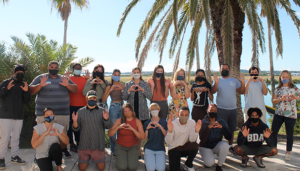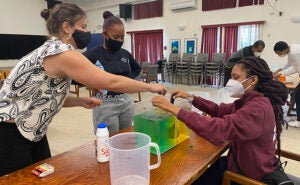A Climate Connection for College Students

Participants of a two-day climate workshop hosted by BIOS and the U.S. Consulate General in Bermuda gathered at the Institute for lectures and laboratory work in early November. The workshop took place during a significant time, when global leaders (including Walter Roban, Deputy Premier and Minister of Home Affairs in the Government of Bermuda) attended the 26th Conference of the Parties to the United Nations Framework Convention on Climate Change (COP26) in Scotland to discuss the observable effects that climate change has on the environment and commit to action.
Nine Bermuda College students participated in lectures, hands-on laboratory activities, and a plankton-collecting trip during a two-day climate change workshop earlier this month through a partnership between BIOS’s Ocean Academy and the United States Consulate General in Bermuda.

BIOS National Science Foundation Research Experiences for Undergraduates intern Kaitlyn Lindholm (left) described her autonomous glider project to Bermuda College students Jihad Muhammed, Nicholas Davis, and MaLahku Selassie.
Lectures at the start of the workshop introduced students to climate change and shared an overview of BIOS research on ocean circulation patterns and the physiological effects of a warming ocean on marine organisms. The students, who stayed at BIOS for the residential experience, then rotated in small groups with the current class of National Science Foundation Research Experiences for Undergraduate (REU) interns who were also on campus this fall for the annual program. Their discussions focused on plastics in the marine environment, coral reef systems ecology, and the biological carbon pump in the Sargasso Sea.
Connecting with peers from U.S. colleges and universities allowed the group to learn research concepts, climate literacy principles, and how climate change impacts Bermuda and our planet, said BIOS science education officer Claire Fox, who coordinated the workshop with BIOS director of education and community engagement Kaitlin Noyes.

After collecting plankton the prior evening, Bermuda College student Daque Davis (right) and Markel Musson learned how to sort zooplankton using the ZooSCAN, a waterproof scanning device that helps scientists quickly identify and process these tiny marine organisms.
“There are various ways that climate change will impact the small island nation of Bermuda and an underlying knowledge of earth science concepts enable better-informed decisions about how Bermuda will continue to prepare, and adapt, to a changing climate,” Fox said. Lecturers and laboratory instructors from BIOS included associate scientists Leocadio Blanco-Bercial and Amy Maas, as well as research technician Hannah Gossner.
Bermuda College students Nicholas Davis, Jihad Muhammed, and Pier Simons said they applied to the workshop to gain laboratory experience, better understand issues like ocean acidification, and for the opportunity to work directly with marine scientists.
Student Milvin DeRosa said the workshop reinforced his interest in pursuing a career in marine biology. “Not only did I get to put the knowledge I learned from the classroom into practice and active discussion, I also saw how the REU students were taking what they learned and using it to understand climate change,” he said, adding that the experience “gave me the drive to push forward in my studies.”

BIOS director of education and community engagement Kaitlin Noyes (left) used colored water to show how cold, salty water sinks while warm water rises during a density and ocean circulation experiment with Bermuda College students Pier Simons and Loryn Ming. Behind them are fellow students Nicholas Davis and Jihad Muhammed.
Bermudian students had unique opportunities, such as gathering zooplankton samples during an evening cruise on board a small BIOS vessel, said U.S. Consul General Karen Grissette.
“The students saw the impacts of climate change first-hand and discussed its adverse effects not only on Bermuda, but on the entire planet,” Grissette said. “Bermuda is uniquely positioned to gather critical scientific data that benefits the global community. I am delighted that we enabled more Bermudian students to be a part of BIOS’s important climate research.”
